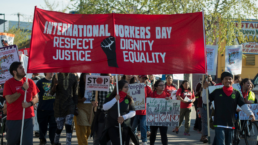In a tangled global economy, how can international labor solidarity go beyond symbolic support?
By Michelle Chen, Dissent
During last November’s Black Friday and Cyber Monday shopping bonanza, the hashtag #MakeAmazonPay started to percolate on Twitter. Activists circulated photographs of small rallies around the world, from a dockworkers’ banner drop in Sao Paolo to a demonstration in Berlin led by tech and warehouse workers opposing “Amazon’s dystopic surveillance practices.” A broad coalition of unions, environmental groups, and other allied organizations coordinated a day of action to condemn the e-tailer’s notorious pressure-cooker working conditions and demand an end to its systematic suppression of union organizing.

The scattered nature of these protests reflected how effective Amazon’s business model has been in atomizing its workforce. The German union ver.di reported a one-time work stoppage of about 2,500 workers across three cities. In Italy, the union SI Cobas posted a video of a one-day blockade of a fulfillment center in Piacenza, with “more than a thousand workers” condemning what the union called an expanding “precarious work model” that “creates a precedent for the whole of Italy, laying the foundations for the ruin of an entire generation of workers.” Yet elsewhere, Black Friday passed with no significant disruptions to Amazon’s business, which broke a record for sales that weekend. By the end of the year, the company had grown its workforce to 1.6 million people, about one-third outside the United States, an increase of 24 percent from the previous year.
The campaign was an expression of solidarity by a global community of sorts, but there were too few workers, too far from each other, to actually jam up Amazon’s gargantuan supply chain. In an increasingly integrated global economy, a huge employer like Amazon can forge a collective identity for workers across the world, but that collective experience does not easily translate into global organizing under the banner of international solidarity. For the last few decades, even as other social justice movements have become more oriented toward transnationalism and global politics, international labor solidarity has often been practiced only symbolically, reflecting the paradox of a global economy in which products and services flow seamlessly over borders that divide and ensnare workers.
Recent Posts
Social Strikes: Confronting ICE and Resisting Authoritarianism
January 17, 2026
Take Action Now An in-depth discussion with Jeremy Brecher on the strategy, potential, and challenges of mass social strikes following the Minnesota…
Israeli Ban on 37 Aid Organizations Expected to Have Devastating Impacts Across Palestine
January 16, 2026
Take Action Now Aid organizations say Israel’s recent ban of 37 groups has dealt a severe blow to humanitarian work across Palestine. In Gaza, it…
U.S. Surging Military Assets To the Middle East To Prepare for War With Iran After Trump Postpones Attack
January 16, 2026
Take Action Now Reports claim that Netanyahu asked Trump to delay the attack as Israel wants more time to prepare for counterattacksBy Dave…
Ford worker suspended after confronting President Trump over Epstein files during Michigan plant visit
January 15, 2026
Take Action Now A viral exchange inside a union auto plant has triggered union scrutiny, political backlash, and renewed questions about the…




